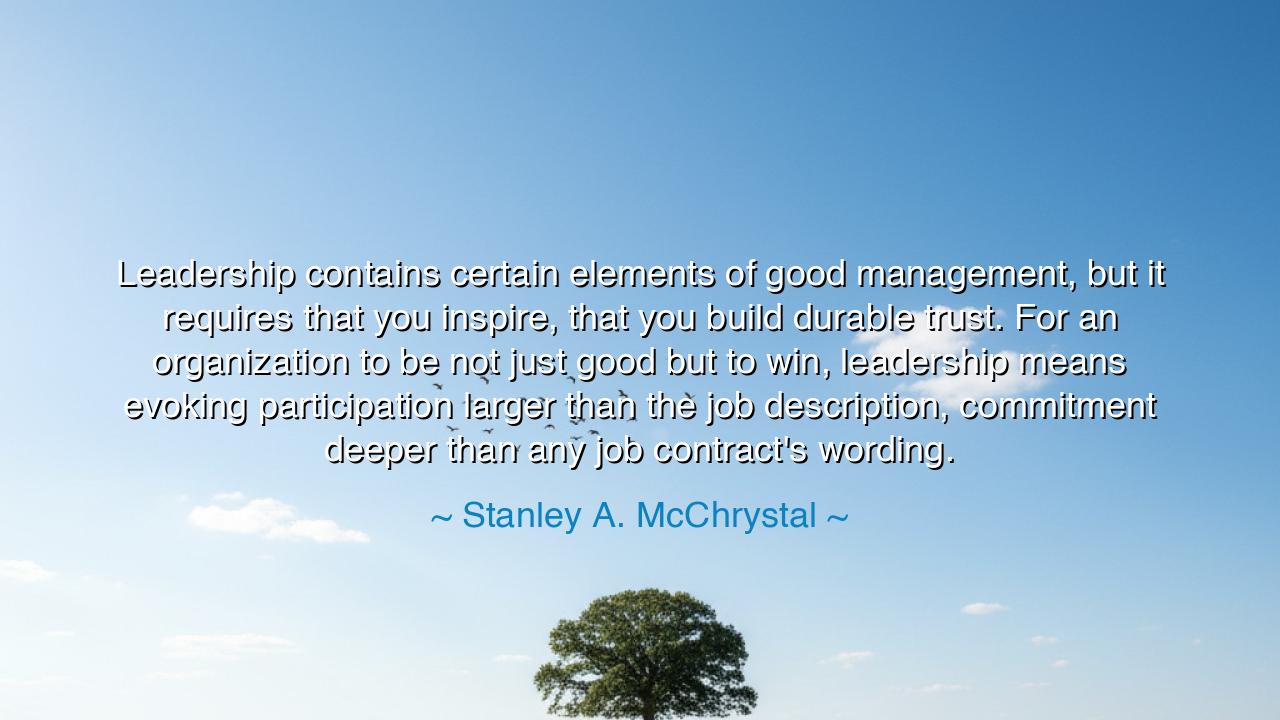
Leadership contains certain elements of good management, but it
Leadership contains certain elements of good management, but it requires that you inspire, that you build durable trust. For an organization to be not just good but to win, leadership means evoking participation larger than the job description, commitment deeper than any job contract's wording.






Hear, O seeker, the voice of Stanley A. McChrystal, a general who walked amidst the storms of battle and the trials of command, who declared with clarity: “Leadership contains certain elements of good management, but it requires that you inspire, that you build durable trust. For an organization to be not just good but to win, leadership means evoking participation larger than the job description, commitment deeper than any job contract’s wording.” In these words resounds a truth older than kingdoms and empires—that the measure of a leader is not in mere control, but in the fire they kindle in the hearts of others.
For what is management but the keeping of order, the tallying of resources, the careful alignment of tasks? These things are necessary, as the bones are necessary to the body. But bones alone do not make a living man. It is leadership that breathes spirit into the form, inspiring movement, courage, and sacrifice. A manager ensures that the work is done. A leader ensures that the people believe, that they dare, that they rise to acts beyond the cold ink of their contracts.
Consider the tale of Leonidas at Thermopylae, the Spartan king who stood with three hundred against the tide of Persia. Did his men stand because their rations were accounted for, their schedules neatly ordered? No—they stood because trust bound them, because their leader’s courage inspired them, because they gave themselves not merely as soldiers, but as sons of Greece defending their people. Their commitment was not written in wages or duty rosters; it was written in their blood, their hearts, their will. This is the mystery McChrystal names: that true leadership draws forth a loyalty that no law, no parchment, no contract could compel.
In every age, organizations rise and fall not on the strength of their management, but on the vision of their leaders. A well-managed company may endure for a time, steady as a ship in calm waters. But when storms descend—when markets collapse, when dangers loom, when chaos presses in—it is only the leader who can summon courage where there is fear, unity where there is fracture, and hope where there is despair. Without this spark, the best rules and processes crumble like sand. With it, even broken armies and fragile teams can triumph against the odds.
But beware: such leadership demands more than words. It demands character. To “inspire” is not to flatter or deceive, but to embody the very virtues one asks of others. To “build durable trust” is not to manipulate but to act with such consistency, humility, and honor that others will stake their futures upon your word. Trust cannot be commanded; it must be earned. Inspiration cannot be faked; it must be lived. Thus, the leader’s greatest work is not outward but inward—crafting a soul of integrity, patience, and courage that others may follow without hesitation.
The lesson, then, is this: if you seek to lead, do not be content with good management alone. Strive instead to awaken in others a sense of purpose greater than themselves. Call them to a mission, not just a task; to a fellowship, not just a workplace. Build bonds of trust that endure not only in times of ease, but in the crucible of trial. Let your presence kindle courage, your actions invite loyalty, and your words lift the weary into new strength.
In your own life, begin with small acts. Speak truth, even when silence would be easier. Keep promises, even when no one is watching. Praise sincerely, guide patiently, and stand firm when difficulties arise. When you lead, do not ask merely, “What must they do?” Ask instead, “What might they become?” In this way you will not simply manage people—you will inspire them. And when the storms come, as they always do, they will stand with you, not because they must, but because they believe.
Shall I shape this into a cadence for narration—like the rhythm of a teaching delivered by torchlight, with rising power and solemn pauses—so it may echo more deeply in the ear of the listener?






AAdministratorAdministrator
Welcome, honored guests. Please leave a comment, we will respond soon